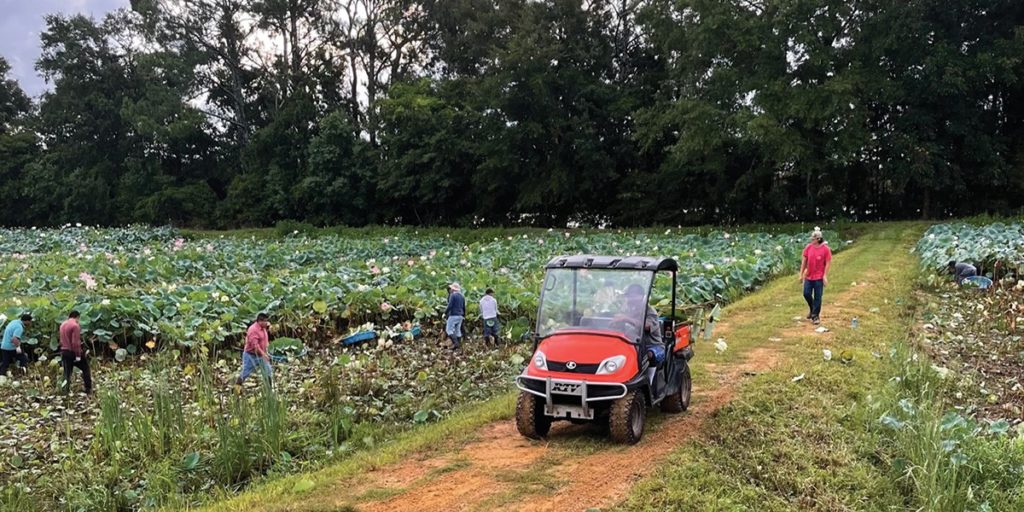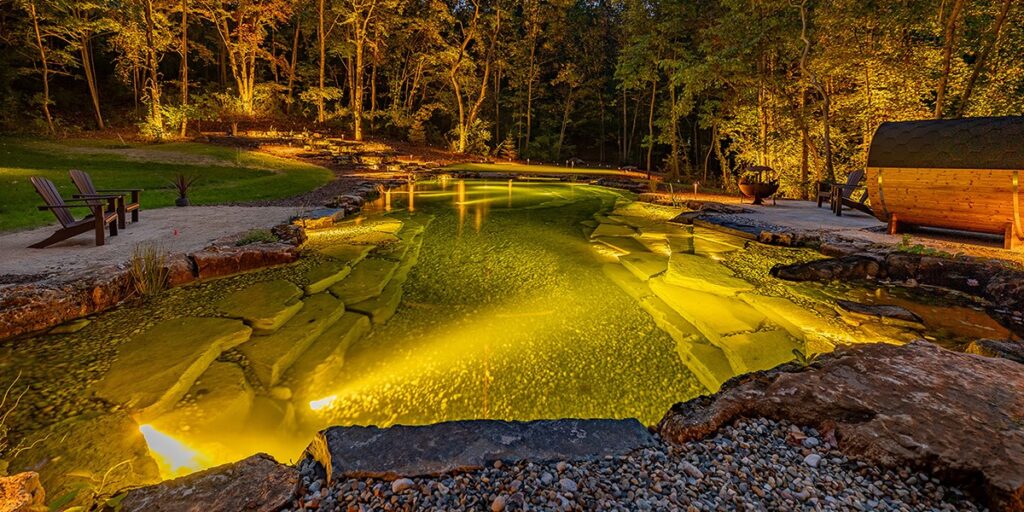
It’s so fun to have life experiences! For me, flying down to Alabama to visit Laura Bancroft of Ten Mile Creek Nursery was one of them. Earlier in 2022, Laura invited me to come out during what I thought was the harvest of lotus — but this was on a whole other level!
Laura went on to explain to me that I would be experiencing a “biomass harvest.” This happens once a year —a team from New York arrives and sets up camp for a few weeks, and then the fun begins.
Roots of the Biomass Harvest

So, how did this whole amazing process come to fruition? Ten Mile Creek Nursery is the largest grower of certified organic lotus in the United States, where they harvest and sell about 400 different varieties of lotus. Laura is especially well known in the business for her lotus, and she works alongside her son Ben, who has been taking over the reins of the biomass production.
They were contacted by Ashland, an international biochemical company based in New York, to grow certified organic lotus en masse to be produced and used specifically for high-end skin creams, suntan lotions and other beauty and health products. Ashland was previously working with lotus growers in China and Thailand, but by the time the plants were picked and shipped, they had lost most of the fluid before they could be processed in the United States.
Ten Mile Creek Nursery has 25 acres divided into 17 ponds that are filled with certified organic lotus grown specifically for biomass harvest. The crews move from pond to pond each day until every lotus is cut down. Everything is tagged from each pond that the lotus comes out of for quality control purposes. Some crews are cutting, and other crews are in charge of taking the harvest back to the processing area. The cut lotus needs to be fresh and processed immediately before any liquid is lost.
Laura had me out in the field at 5:30 a.m. to beat the extreme summer heat of South Alabama. Ten Mile Creek Nursery hires a seasonal crew of about 35 people who eagerly show up each day to harvest every part of the lotus — the stem, leaves, buds and flowers. The rhizomes are not harvested, instead left to grow and replenish the ponds.
Laura uses plastic baby pools and scarfs up all of them in her area. Once the large trays of cut lotus make it back to the area where the Ashland team has set up shop for processing, the amazing process begins.
Liquid “Gold” Lotus

The harvested lotus stem, leaves, flowers and seed pods are put on a conveyor that carries it into the grinder. From there, the ground biomass goes through a press to remove all the liquid. The fresh green liquid gets pumped out into a barrel-sized container and placed into 5-gallon buckets. Once the liquid is in the bucket, it gets whisked away to a giant onsite walk-in cooler, where it is immediately frozen.
The finished frozen product gets shipped back to New York at the end of the harvest, where it is refined without the use of any solvents or chemicals. The result is the wonderful serums, lotions and perfumes that Ashland is in pursuit of for their clients.
Rest assured, nothing goes to waste, for the leftover solid material that they call “cake” is used for compost and returned to the ponds to nourish the next crop of lotus that grows. The daily goal is to process around 5,000 lbs. of fresh biomass.

The day I was there, they broke a record and had a weigh-in of 6,700 lbs. Ashland’s goal is to process at least 45,000 lbs. in the two weeks they are there. The total amount this year exceeded that goal by several thousand pounds. (Ten Mile Creek Nursery is paid by the pound.)
After my visit, curiosity got the best of me, and I splurged on a jar of Lotus Night Recovery Cream by Fresh. Let me tell you, the product is amazing! I can see what all the hype is about — I can see a difference in my skin. There are so many overall health benefits to lotus, and skin creams now make the list. After seeing the process and experiencing the magic of lotus on my skin, now I’m hooked!
Did Someone Say, “Snake?”
” There’s nothing like being on-site and hearing someone yell, “Snake!” Everyone stands perfectly still until someone comes over to scare it away. (That’s what the shotgun is for.)”
Lora Lee Gelles
Before I booked my ticket to Alabama, I asked Laura if I would encounter any snakes on my visit to the lotus fields. I told her I was deathly afraid of them. She didn’t think I would be that close to the workers, but I told her that I like to get right in there and take photos. She mentioned that they drain the bogs the evening before they work in them so that the snakes can slither out and not cause a problem. She then told me not to worry, for they have someone in the field with a machete at all times. (What??)

Of course, I also had to ask if there was a chance I’d see any alligators, and she replied, “Of course there are alligators in the area — this is Alabama!” After a short-lived total flip out, I booked my airplane tickets.
As we pulled up to the fields in the morning, I saw a gentleman walking around with a shotgun. I turned to Laura and asked her what was going on. She went on to explain that since it had rained cats and dogs the evening before, whatever water they had drained out of the lotus bogs filled right back up, which meant one thing — snakes! There’s nothing like being on-site and hearing someone yell, “Snake!” Everyone stands perfectly still until someone comes over to scare it away. (That’s what the shotgun is for.)
I was out there for 45 minutes, and I heard the scary s-word four times. Laura assures me that most days they see no snakes at all, so I guess I just hit the jackpot. Thankfully I survived, and I want to thank Laura for the crazy adventure that I can now tell my grandchildren about.




Amazing Work ma’ma 👏